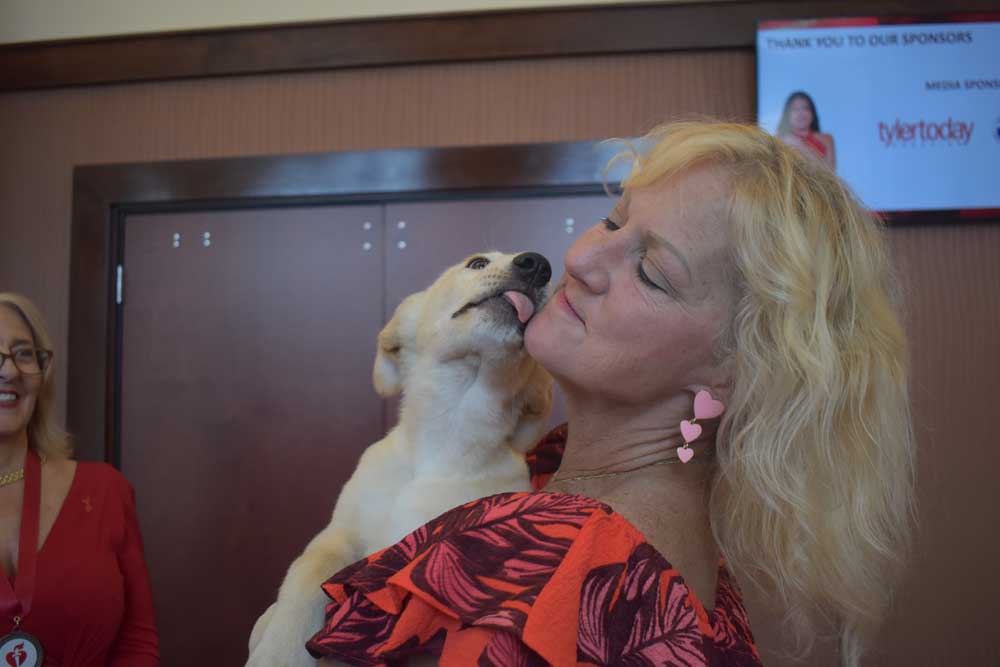Tyler Go Red for Women Luncheon emphasizes importance of education on heart health for women
Published 5:30 am Saturday, May 18, 2024

- Daphne Smith of Nicholas Pet Heaven brought dogs to the luncheon. Guests were able to see and play with the dogs. (Raquel Villatoro/Tyler Morning Telegraph)
On Friday, around 300 attendees wore red in support of the Tyler Go Red for Women Luncheon at Green Acres Baptist Church Crosswalk Center. The American Heart Association organized this event to educate women on cardiovascular health, said Teresa Boardman, American Heart Association Tyler Area Development Director.
“Cardiovascular disease is the leading cause of death in women, claiming more lives than all cancers combined,” according to the AHA.
Trending
Heart Survivor Amy Doherty spoke during the Tyler Go Red for Women Luncheon about her experience of being dismissed by doctors despite having symptoms of a heart issues. Dr. Robert Carney, Tyler Cardiovascular Consultants of Tyler Interventional Cardiologist, shared health advice.
Doherty experienced lightheadedness, chest pain, and sleep issues a month before she had heart surgery. She went to her regular doctor who told her the chest pain was due to her cycling. She went back again and again, each time he said the same thing.
One day she was not feeling well so her daughter told her to go to the ER. When they took her blood pressure, it was 204/198. She stayed there for two days as they ran multiple tests. They told her she was fine and sent her home. However, her symptoms kept getting worse.
In February, she went to the Go Red for Women Luncheon. As she heard the speaker she realized those are the same symptoms she was experiencing. Afterwards, she went back to the ER.
“They said exactly the same thing,” Doherty said. “‘Go home and take a Benadryl. It’s probably anxiety.’ I started to feel like I was being ridiculous about all things that were happening to me.”
She continued seeking help for health issues at a cardiologist, who was able to run the cardiac calcium score. She failed the test and had to have open heart surgery. On May 1, she celebrated five years since her surgery.
Trending
“It hasn’t been an easy journey coming out of that and it’s frightening for me,” Doherty said. “It’s a hard thing every time I feel a little flutter or feel lightheaded, I go, ‘what’s wrong with me,’ but I have a great support system in my family and my friends and I’m very active.”
She has learned to prioritize rest through this journey.
“I know to take a nap is good, to rest, to listen to your body, hydration, all of those things and if … I can’t do it, I can’t do it,” Doherty said. “I’m here today, that’s the most important thing to me and that I made it through it and I listened to my body.”
Carney advises to pay attention to any differences in your body. Blockages have no rules. He has seen people who discovered blockages in their earlobe, back or teeth. The pain people commonly associate with heart attacks is chest pain. This is wrong because it is not a pain and not limited to your chest, Carney said. It can be in your jaw, neck, teeth, elbow, upper and lower chest, your arm and your side. He saw a patient who had pain on her left wrist. Some women may have discomfort in their back, Carney added.
“Chest pressure, aching tightness, squeezing; we equate that with, ‘well that’s not bad because it’s not a bad pain.’ It’s not about the pain,” Carney said. “It’s about the chest pressure … if you have chest pain, not just the amount of pain, basically, that’s your concern.”
Only half of women will have symptoms of chest pain. The other half will have fatigue, dyspnea, or shortness of breath, Carney said. In order to improve screening, it needs to be tailored to the person. For someone with Lupus, or a vasculitis disease, they may have low cholesterol and low calcium but still have heart disease, Carney added.
“You gotta get the person in, then you explain it … and then you do what they need on an individual basis,” Carney said.
Carney believes nutritional problems in the U.S. are part of the problem. Fructose is illegal in Europe and he expects it will be illegal here too in the future.
“It’s inflammatory, promotes dementia, promotes heart disease,” Carney said. “I was addicted to Diet Coke. I think that artificial sweeteners are really bad. I’ve given that up. I think that we need to pay more attention to what we eat.”
For Amanda Gadison, emcee and KLTV East Texas Now host, cardiovascular health is close to her heart.
A friend of hers hit the ground while visiting East Texas. He had to be rushed to a Dallas hospital. When he woke up 15 days later, he had a new heart. She is grateful organizations like the AHA exist. If it were not for those donations, her friend, Scott, would not be alive today.
“So we are thrilled to be here today to celebrate and push forward the mission … I know that I personally am,” Gadison said. “There’s no greater force, I hope you all agree, than women united with purpose and passion.”
For another speaker, a heart attack nearly cost the life of a parent. On a warm summer day, in 2018 speaker Kristen Brice’s father was gardening in his backyard when he collapsed. They did not know at the time he was having a heart attack. Her mom was able to perform hands-on CPR and save his life.
“That is my why,” Brice said. “That is why I devote my time to [the] American Heart Association. And Go Red For Women. So women, not just men, have a good understanding of how to take care of their heart and know the signs and symptoms for a healthier life.”
This year AHA celebrated its 100th year anniversary. This year the organization’s impact goal is to focus on health equity, said Lecia Bowman, Chief Nursing Officer at UT Health Tyler.
“Every person deserves the opportunity for a full, healthy laugh,” Bowman said. “As champions for health equity the American Heart Association will advance cardiovascular health for all including identifying or removing barriers to health care, access and quality.”
Attendees ate a heart healthy lunch which included a salad, chicken, green beans, mashed potatoes and dessert. They were able to take pictures and participate in a silent auction. During Gadison’s speech, she asked the audience to take a selfie with the people around them.
For more information on the AHA, visit https://www.heart.org/.






